Poetics of Science: Through Itself
Friday, 23rd June, 2017
18:00
Sunday, 25th June, 2017
16:30
Return
'Through Itself' is the second in a series of 3 weekend seminars
The compelling idea that inspires The Poetics of Science seminars is inspiration itself. Inspiration is an inexhaustible source through which the human reality can be directly known, be it through the science of the physical universe explored as an object, or through the embodied discovery of the hidden, interior realm of the heart
The speakers’ work is guided by a global concern and foresight and will explore ideas conducive to creative collaboration. The weekend offers a rich programme of interactive presentations and workshops, including Philosophy, Literature, Contemporary Music, Psychology, Healing and Art. The Seminar and music nights will be held in a large pavilion next to the beautiful 18th century Georgian House.
Full Programme, Cost and Booking
On Conscious Participation
An introduction to the weekend's theme, reflecting on its metaphysical implications from different religious perspectives.
with Gwendolen Dupré
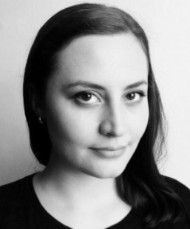
Having done her undergraduate degree in Religious Studies, Gwendolen considers the metaphysical frameworks at work within Buddhist, Hindu, Christian and Sufi thought, considering the similarities between these perspectives with regard to how the term Through Itself might relate to them.
Gwendolen Dupré is an artist and aspiring academic currently living and working in Glasgow. She graduated in 2016 with a degree in Theology & Religious Studies from the University of Cambridge and her main research interests are religion, continental philosophy, morality, literature, feminist theory, art & film history.
Sense, Vision, Insight, Form: a poetry workshop
with Andrew Singer
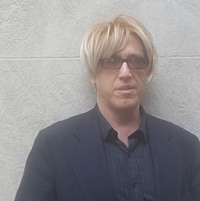
Wouldn’t you like to unlock more of your poetic potential? Poet and teacher Andrew Singer leads this workshop as a creative unlocking in several stages, presenting a set of tools, techniques, examples and poetic understandings, with exercises for quickly reaching a new layer of poetic creation and polish. No prior experience or preparation is needed for this workshop. (2 hours)
Andrew is founder and head of Trafika Europe. He studied poetry writing with Nobel Laureate Derek Walcott for an MA in Creative Writing from Boston University, and teaches courses in European literature, literary translation and creative writing at Penn State University. He has led poetry workshops and given talks and readings widely in more than a half-dozen countries, including with British Council. As a poet, author, translator and artist, he is guided by a spiritual understanding of what we are living through, in the rapid transformation of our shared global culture. He currently lives in New York City.
What is Phenomenology?
with Huw Gault
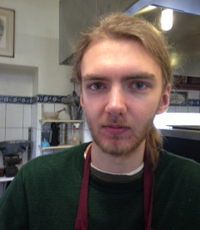
What is phenomenology? It’s a six-syllable word. So many syllables suggest it must be something extremely complicated. Whatever it is, Huw’s explanation of it will not be complicated. In ways which will be easy to follow, he will explain how phenomenology can help us understand the nature of reality …. and how it can’t.
Huw Gault Huw Gault received his education in Scotland and Holland. He has wide interests ranging particularly over philosophy, physics and history. He creates and writes interactive internet games. Huw's writing is noted for its imagination and humour. For him the ideal job would be being Socrates (but with better prospects). However, for now Huw serves as the kitchen manager at Chisholme.
Along the Shores of Bewilderment
with Mark Boston
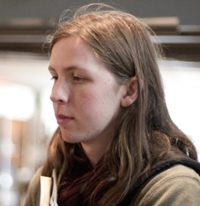
Mark will share his insights into the mysterious worlds of the imagination, examining the state of bewilderment as a fundamental companion on the creative journey. A presentation of work will then focus on animation as an unparallelled meeting place for countless art forms, demonstrating its rich potential for expressing the diverse, interior realms of the human being.
Mark Boston is a freelance painter, animator, cartoonist and poet who loves storytelling in all its forms. In some vegetable gardens, he is also known as the Bewildered Cauliflower, a mysterious creature found washed up in the outer wilderness of the dreaming. When asked about his origins, he whispered that he had been raised by wild rhubarb and is now using human form to explore the uplifting powers of art.
In 2016, Mark graduated from Edinburgh College of Art with a first-class degree in Animation. He then went to Poland to work on the upcoming Loving Vincent, the world's first fully painted feature film. Since then he has painted murals in Mexico, created animations for Trafika Europe, and is now developing illustrated storybooks.
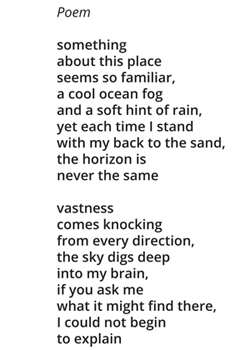
The Implicate Order of Music
with James Wyness
Drawing on disciplines as diverse as evolutionary biology and semiotics, this illustrated talk will set out to engage the participants in creating fresh understandings about music, the function of music, its origins and its manifestations in the current era. Like language, musical behaviour exists in every culture. Both may have co-evolved to some extent, yet they serve different functions. A scientific approach, working with an ad hoc hypothesis, might try in the first instance to understand music as a phenomenological reality, something understood physically, cognitively and emotionally, yet immediately, without mediation, understood ‘through itself’ and not through cultural conditioning, romantic notions, commercial imperatives or transient trends.
According to physicist and philosopher David Bohm who theorised the notion of a holomovement in our awareness of reality, music is an active implicate order in the sense that ‘it continually flows into emotional, physical and other responses that are inseparable from the transformations out of which it is essentially constructed’. Matter and consciousness can be considered to be projections of a common ground. This ground is enfolded in our consciousness. We could argue then that music and consciousness are of the same order and measure. Despite the contrived language around these matters, I would hope that we can come to a simpler and better understanding of music, both the sound and ground of music, by letting go of assumptions and culturally ‘deconditioning' ourselves, at least temporarily.
James Wyness is a composer, sound artist, spatial practitioner and researcher. He composes and performs new music using hand-made acoustic and digital instruments, field recordings, found objects and electronics. In attempting to understand and articulate the idea of music as a system of forms rather than a commodity subject to transient trends, his research has touched upon fields such as evolutionary biology, paleoanthropology, semiotics and morphology. His musical work crosses the boundaries between generic forms such as ambient, minimalist, noise and electroacoustic music. A full discography, including audio streaming, can be found at his personal site.
As a sound artist he works on large-scale, long-term collaborative projects, currently developing an arts/science collaboration around the sonification of climate change data with a view to establishing a permanent sound installation that responds to real-time data.
Based in the Scottish Borders he is currently developing The Planning Department, a new artist-led collective who aims to produce challenging, yet accessible intermedia experiences through site-specific art set in unorthodox and forgotten sites and environments. The group’s wider aim is to serve as a real and virtual hub for national and international artists and to establish partnerships across communities and creative industries.
His work is performed and presented internationally. In his frequent collaborations he works with visual artists, dancers, choreographers, writers, theatre and film producers.
He is currently co-authoring a book on sound and music with Italian composer Giancarlo Toniutti. In dialogue form the book, An Atlas of Instabilities, takes a time-honoured experimental scientific approach to the understanding of music as a phenomenology of forms.
James has an MA (Honours) degree in French Studies and a PhD in music composition from the University of Aberdeen. Read more...
The Uses of Attention in the Lives and Works
of the Death-Cell Philosophers
with Martha Chamberlain Cass
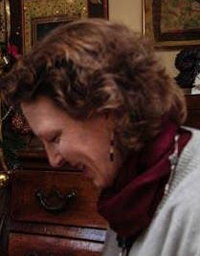
Martha studied at Yale University and the Chisholme Institute in the 1970s and 80s, and then at the University of Birmingham (UK) from 2005-2011. Her interests include the development of an individual’s adaptive strategy, by necessity, in infancy, and the ‘un-making’ of this strategy, by choice, in adulthood.
She will be speaking about this ‘un-making’ of the self in the writings and experiences of some of the ‘Death Cell Philosophers’ of the 20th C.
"The description ‘death-cell philosophy’ was first used by Margaret Masterman, a philosopher and linguist in Cambridge in the post-war years. One of her colleagues in the group known as the Epiphany Philosophers was Dr Rowan Williams, and it was in one of his writings that I first came across this phrase. He writes, in his forward to a book about Etty Hillesum (1914-1943), “Anyone studying her…will emerge convinced that she can properly stand with Simone Weil, Dietrich Bonhoeffer, and Maria Skobstova as a signal representative of what has been called the ’death-cell philosophy' of the twentieth century: the discovery of a real and completely, powerfully transforming divine faithfulness, present even in the depths of the nightmare of totalitarian inhumanity.”
"The juxtaposition of this ‘transforming divine faithfulness’ with the prolonged experience of mortal threat will form the basis of our discussion in this seminar.
We will look at the ‘construction’ of the self from conception to late infancy, and the choice to de-construct or un-make it in adulthood. And we will take as examples and teachers the great death-cell philosophers mentioned above, along with some others who might not normally be included in their ranks. We will consider how attention, concentration, stress, distress and loving service played important roles in their lives, and what role they might also play in ours".
The Story of Trafika Europe
with Andrew Singer

In this talk, Andrew Singer discusses the origin of the literary project Trafika Europe, insights gained along the way about European life and cultures, and about the new initiative Trafika Europe Radio – a new, shared radio station for European literature.
When the Soviet Union ended, a spirit of increasing cultural unity swept through Europe and much of the world for the next several years. That was when, in the early-mid 1990s, the original Trafika literary project was founded by a group of American expats in Prague. Focusing on new literature in English translation from around the world, it was an exciting project and very well-received.
Global literature in translation is now more well-established – but times have also moved on. Living long-term in Hungary, Singer witnessed two strongly distinct cycles, over the ensuing years, in how Hungarian culture experiences itself in relation to Europe and the world. Following this, a year in Scotland added radically different insights into how cultures can interact and remake themselves with forward-looking vision in the European context. In parallel, Singer engaged widely for a couple of years in conversations about how cultures develop, the kind of world we’re seeking to co-create – and why it matters, in the context of a new set of shared challenges we are facing all together in this age of the world.
What is needed now? How can this cultural conversation continue to progress? What new tools are available, what is useful to contribute culturally in today’s Europe, and how?
Strangers Talk; Friends Listen
Listening to Energy: A Workshop with Christina Mark
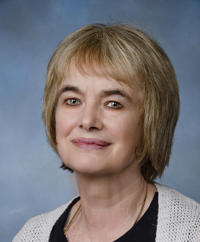
‘Everything is essentially Consciousness, Purity and Joy’
Shankara 9th Century Mystic
Consciousness expresses itself through the energy of life – in people, places and nature. It expresses itself uniquely in every being.
It unites us in common understanding, when we can learn about ourselves and others, and in the world we live, through acknowledging our differences, exploring them, and finding the way forward through love and awareness.
The workshop that Christina Mark is delivering for the ‘Poetics of Science Seminar: Through Itself’ is guided by the Itselfness of the Consciousness of Energy, as it expresses itself in places and in people.
Listening to Energy in places can be amplified by using a crystal to reflect the atmosphere of a setting; listening to energy in others can be inspired by reflecting on the words and phrases that we use when we talk about ourselves; listening to energy in ourselves can be felt by muscle testing for our bodies and enlightened by meditation for our souls. These four ways of listening to energy will be explored in the Workshop at the Seminar.
Christina has focused on listening to energy for the last twenty-five years, and finds it an endless source of inspiration.
Christina has been a student of the Beshara School since 1977. This education has been the guiding light in her life, and continues to be so. She has worked in health care for nearly fifty years, as a nurse, as tutor in Further Education, and as a healing practitioner and tutor with the National Federation of Spiritual Healers Healing Trust. She has organised regular healing clinics in the Chaplaincy Centre of the Borders General Hospital in Melrose for the last thirteen years, and worked as a ward visitor in a voluntary capacity since 2008.
Christina is the author of: 'Energy Healing: The Practical Workbook', published by Watkins and is currently editing: 'Energy Healing: The Training Manual', and has written a parenting booklet: 'Life Story Book'.
Find Your Voice: an exploratory session of discovery
with Ellie Zeegen
“Our deepest fear is not that we are inadequate. Our deepest fear is that we are powerful beyond measure. It is our light, not our darkness that most frightens us. Your playing small does not serve the world. There is nothing enlightened about shrinking so that other people won't feel insecure around you. We are all meant to shine, as children do. As we are liberated from our own fear, our presence automatically liberates others.” ~ Marianne Williamson
The sources of both “voice” and “vocation” are close to the Latin word vocare, which means “to call, or invoke”. Our voice is the thing that is being called out of us in the midst of all we do. It is the underlying why of our passion.
Ellie will provide a holistic, supportive workshop tailor-made for all those who have experienced The Poetics of Science weekend at Chisholme. Uplifting, freeing vocal exercises will be combined with an exploratory session of discovery to help uncover our authentic voice, the source of both meaning and purpose in our life's work.
Ellie Zeegen
After gaining a BA (Hons) in Literary Studies/Drama at University of the West of England, Bristol, Ellie went on to be the Co-Founder of The Actors' Temple in London's West End (est 2005), an exceptional acting school whose ethos is based on the principles of Sanford Meisner.
Shortly after the birth of her daughter, she moved with her husband John from London to the Scottish Borders. It was here in 2010 that she launched the award-winning Firebrand Theatre Company and as Co-Artistic Director has since forged and produced every one of their Scottish tours. The story of Firebrand so far is told here via a world-renowned PechaKucha evening.
Possessing a passion for utilising a space to its full potential and believing theatre can be performed anywhere, she has performed in Firebrand's latest site-specific plays The Great Train Race by Robert Dawson Scott, Letter of Last Resort by David Greig and this Summer will perform in What Lies Beneath? by Tom Murray which will preview at Wilton Lodge Park Walled Garden in Hawick on July 16th 2017. Set in and around a working archaeological dig, the performance will feature a unique post-show opportunity to handle historical finds and participate in a Q&A session.
For over 3 years, to support herself while forming her acting career, she worked closely as PA to the psychotherapist and psychologist Professor Petruska Clarkson and combined therapeutic elements with over two decades of experience in the theatre industry to coach actors and professional speakers alike in unlocking their potential and inspiring confidence to perform. She has facilitated numerous Page to Stage sessions via CABN for writers and actors developing scripts and most recently has led performance skills workshops for a Poetry Showcase at Abbotsford and the equestrian stunt company Les Amis D'Onno.
Friday Night: Music filled with heart
with Sylvain Ayité and friend Rameses Modi
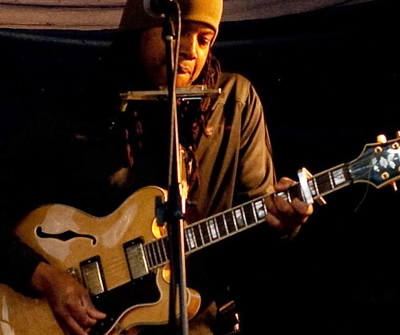 Music filled with heart, performance full of joy, rhythm, warmth and honesty, that’s what Sylvain Ayité is serving us: stories about love, hope, beauty of life enchanted in songs in Wolof, French, Portuguese, Creole and English. Sylvain is being his true self on the stage, the right person in the right place, sharing his experience with us.
Music filled with heart, performance full of joy, rhythm, warmth and honesty, that’s what Sylvain Ayité is serving us: stories about love, hope, beauty of life enchanted in songs in Wolof, French, Portuguese, Creole and English. Sylvain is being his true self on the stage, the right person in the right place, sharing his experience with us.
Sylvain Ayité is a guitarist, singer and songwriter born in Senegal, son of Ghanaian man and Cape Verdian woman, based in Edinburgh.
Saturday Night Concert
with James Wyness and guest musicians Joe Murray and Nicoletta Stephanz
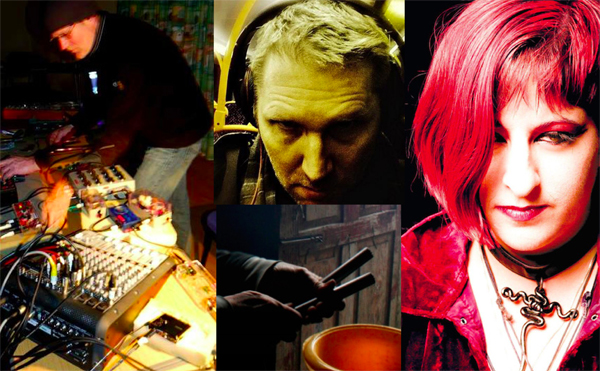
In this concert, there is no score as such. Choice of instrumentation is eclectic and unorthodox - the tools of the trade have become sound generating devices chosen, designed or found according to their sonic properties, flexibility and versatility. The musicians will rely less on conventional gestures and orchestration, less on the the three fundamentals of the Western paradigm, harmony, melody and rhythm and more on developing the intricacies of morphogenesis and producing structures of timbral interest, on listening to the emergence of collective complexity. Accident, instability and serendipity are embraced in equal measure - at any time the whole affair might collapse, only to be picked up again and recycled. The audience, as ever, completes the rest.
Joe Murray has been playing under the name Posset for the last decade. Specialising in improvising with handheld tape recorders and Dictaphones Posset creates a unique sound-world full of hiss and mystery.
A prolific performer Posset has played all four corners of the UK and abroad frequently collaborating with like-minded artists in one-off collaborations and several long-running projects: Wax Magnetic (with Mariam Rezeai) and Papal Bull (with Jon Marshall).
His ever-growing discography stands currently at over 50 releases with tapes, seven inch singles and CDrs available on a number of specialist labels based across the globe: Singing Knives, Invisible City, Discombobulate, No Basement is Deep Enough, Vitrine, Tutore Burlato, Beartown & Chocolate Monk (among others).
Joe also writes for the influential blog Radio Free Midwich on the No-Audience Underground.
Nicoletta Stephanz creates sensory environments with her voice, electronic and traditional instruments, and through treating found objects, combining sound with aromatherapy, live film, fengshui, and theatrical elements.
She has performed and recorded with a variety of musicians and artists including Gong, Daevid Allen, Edward Ka-spel/The Legendary Pink Dots.
She has built some of her instruments, including her theremin, which is one of the world's first electronic instruments. Nicoletta has toured around the world, playing large music festivals and intimate rooms...and this is her first theremin performance in the Scottish Borders, mere steps away from her latest home.
All life is Music. All life is Vibration.
For Timetable, Costs and Booking click here...
For more information, email info@chisholme.org
Tel +44 (0)1450 880215
Please do not hesitate to contact us if you have any questions.
RESIDENTIAL COURSES of various lengths are held at Chisholme – from an introductory weekend to a full six-month retreat course.
Read about the courses here
Email secretary@chisholme.org
to register your interest.
RELATED EVENTS
Visit the BESHARA website for a comprehensive series
of online and in-person study events and courses.
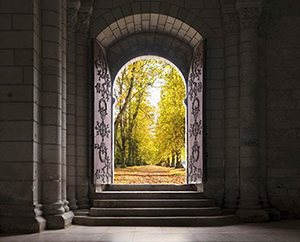 A BESHARA FOUNDATION COURSE
A BESHARA FOUNDATION COURSE
Love and Knowledge in the Light of Unity | the Direct Path
Introductory weekend at Sutton Courtenay Abbey, Oxfordshire
10th – 12th October 2025
(Zoom attendance also available)
10 x bi-weekly online sessions
23rd October 2025 – 26th March 2026
Thursday evenings, 19:00 – 20:30 GMT/BST
This course provides a full introduction to the principles of Beshara in terms of both knowledge and practice. Taking the metaphysics of Muhyiddin Ibn ‘Arabi as a starting point, the course explores what it means to understand oneself and the world in the light of the Unity of Existence.
Contact: besharacourses3@beshara.org

UNITY IN THE CONTEMPORARY WORLD
Browse BESHARA MAGAZINE online which considers unity, inclusion and interconnectedness in all areas of contemporary thought, from spirituality to science, economics and the arts.